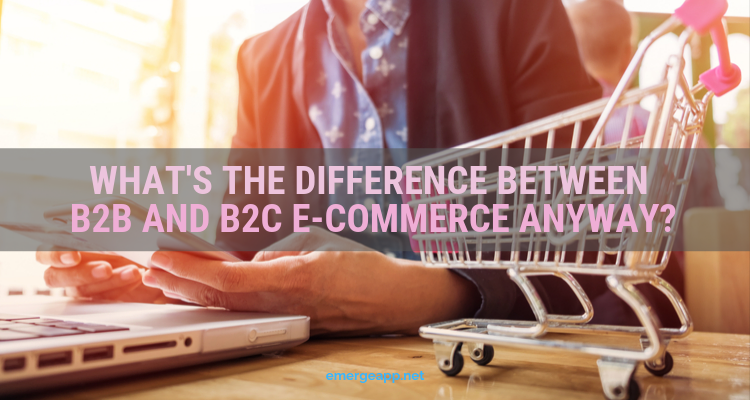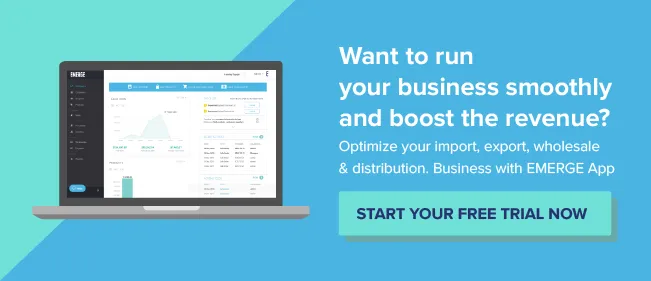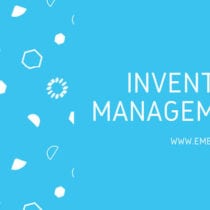B2B and B2C eCommerce: What’s the Difference Anyway?

Introduction
Online retailers have witnessed the revolution of the Internet made in the last decade. They have seen the change of people shifting to the online dealing of services rather than offline. The changes have made online retailers a big thing on the web.
There are many online retailers present online, but if we have to classify them on the basis of the end consumer, there are mainly two categories, B2B and B2C. As an online retailer, you may have an idea of these terms but let’s look on in a profound way.
Regardless of which category that your customers fall into, your business needs the right inventory management software for the job. EMERGE App, for example, supports both B2B and B2C businesses that deal in physical stock.
What is B2B Ecommerce?
B2B stands for business to business eCommerce, where the end product reaches the other business, as a raw product for another product, or for reselling at another location.
The product that your business manufactures is used by another business. The receiving end is another business or retailer.
The business to business transactions are generally huge in number and the parties are involved in a deeper level.
For example, your company produces a certain chemical, which is needed by other business, which uses it to manufacture their main product.
Then the transaction would be done by analysing the optimum price, quantity, quality, and composition. Then both would interact on a B2B website, mentioning needs and requirements.
Usually, B2B transactions don’t happen online, but due to changes trend, businesses are adopting it fast.
They use online way to interact, but most of the dealings happen through phone and meetings.
It is not always a manufacturing business, B2B eCommerce stores are for resellers also.
Suppose a certain product is in the demand in your area, but not available and nobody manufactures it near you.
What would you do to fulfill the demand? You would contact a seller that has the product, make a deal and order in bulk. You can take help of a B2B marketplace for finding sellers and another businessman.
What is B2C Ecommerce?
B2C stands for business to consumer, where the end product reaches directly to the consumer.
The products are manufactured goods, that don’t need further processing on a product level, however, they may need some assembling.
B2C eCommerce has to work on an advertisement, consumer service, delivering and feedbacks.
When you’re dealing with the extreme end, i.e. consumers, you need to be competitive and straight.
The best example would be a musician looking for a piece of headphones and buying it from a B2C website, which would deliver it at his home.
The product volume is limited, which is because usually a single person would order a thing for his/her use.
B2C eCommerce is giants who sell directly to consumers, which require a dedication to acquiring the customer base.
They need constant evolution in the field of improving their services so that they can give best to their customers.
B2C eCommerce examples would be Amazon, Flipkart, Etsy. I wrote a detailed post listing all the online marketplaces, you can check out here.
So, How Are They Different?
B2B and B2C eCommerce are all about selling the product, but they differ on the ground levels.
Where B2B requires deep client knowledge, B2C is just an online shop where selling the product is main motive.
There are lots of aspects on which they differ, let’s have a look on them.
1. Placing an order
There is a huge difference between the purchasing process of B2C and B2B eCommerce.
A B2C eCommerce has less complicated and straight order placing process. The consumer already knows what he’s looking for. He places the order, then it gets processed and delivered to the address. The dealing is done on consumer level, and website is made friendly so that no complications can occur.
On the other hand side, B2B business requires deep analysis of the product, the quality that is going to be used and other optimizations.
The transaction is done by a group of people, by considering various aspects like transportation and handling.
The product volume is large, and handled by professionals. Due to elaborate process, the shipment usually takes time and agreement of various people.
2. Loyalty of consumers
B2C customers have a lot of options to buy from, they check prices, features and specs from various stores when they finally decide which thing to buy.
Consumers have lots of choices, so they won’t hesitate to go to another B2C eCommerce website if the product is better or the price.
That’s why B2C eCommerce has to put extra effort in winning the consumer by advertisement, discounts, and service.
B2B consumers are usually businesses and companies.
They really put the effort in knowing the type of company they’re dealing with, what are the advantages, and likely to have a long term connection with the consumer.
They tend to have business transactions in high volumes for a longer period of time.
The transactions are carried out by considering reliability, credibility, and quality. Trust is the main factor in two parties in B2B transactions. Due to all this, the consumers are more loyal than B2C consumers.
For example, a company that goes through details of other company for buying a dye for weeks v/s a guy looking for a pair of jeans, and finding it in 5 minutes, who is going to be more loyal?
3. Product knowledge
B2C eCommerce consumers concentrate on the usage of the product, they don’t have deep knowledge of the product.
You’re more likely to use the headphones rather than finding out which kind of magnet it is made of.
B2C eCommerce focus on selling the products rather than giving out the profound details. This usually happens because consumers want to experience how well that product works.
B2B consumers have deep knowledge about what they’re getting into.
For example, you’re a textile company and want to know the degree of purity of MEG you’re buying. The idea of knowledge differs when the product has usage that’s likely to effect on large basis.
In this case, you have to have product knowledge to figure out the quality, because you know the significance of that product.
Because of the importance of the decision and how largely the profits based on it, it increases the significance of buying that particular product, which directly means more product knowledge.
4. Marketing
The difference of marketing strategy arrives from the fact that B2B clients are more detail oriented and the decision they take are critical.
They take a decision on calculated risks, logics, and explanations. To them, how can they extract the maximum from the product matters. The decision they make is discussed by various bodies and finally agreed upon.
B2C consumers take decisions on which company is influencing them better, providing better consumer support and famous.
They set of decisions are triggered by emotions, which is good for the personal level, but not if you’re running a company.
B2C consumers see the product as for how they can use it, rather than how well it is for them. So marketing is going to be that way only.
Conclusion
We’ve seen that the difference between B2B and B2C eCommerce could not be greater. One one hand you’re selling to a very large pool of consumer individuals. They are swayed by needs, promotions and brands. On the other hand you have a knowledgeable group of business buyers. They make purchases according to business needs and wants. Regardless of which side your customers fall into, you need a robust inventory management system such as EMERGE App to manage and control your inventory.










